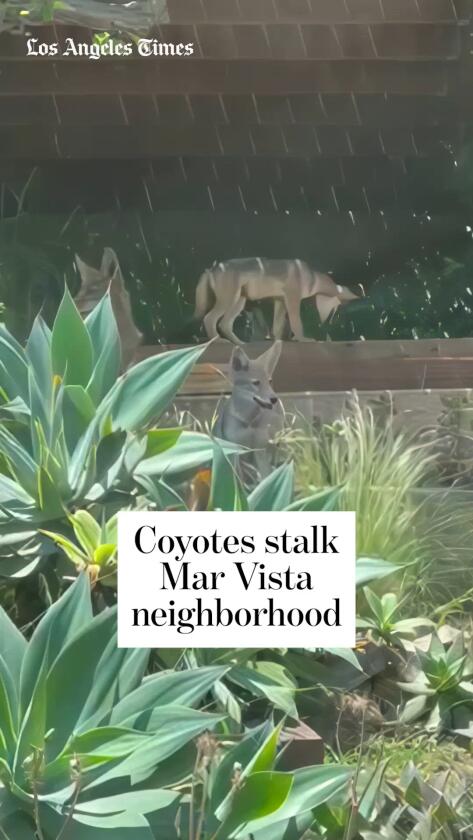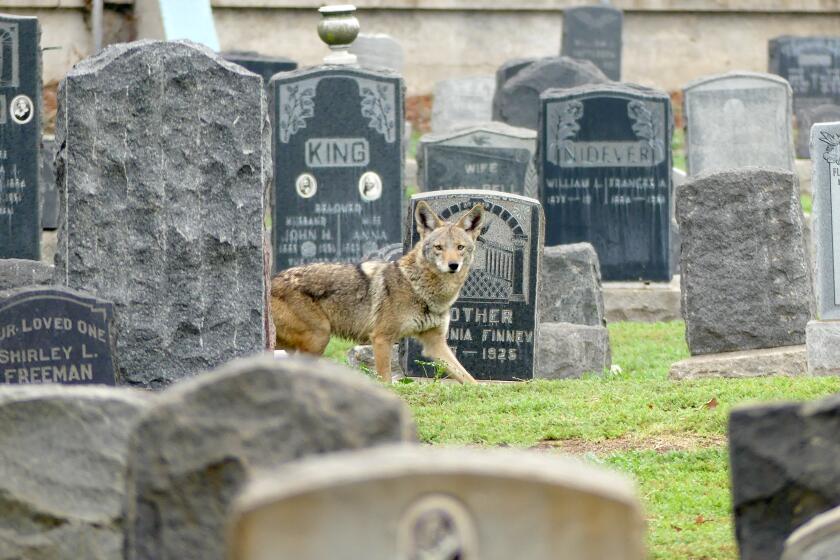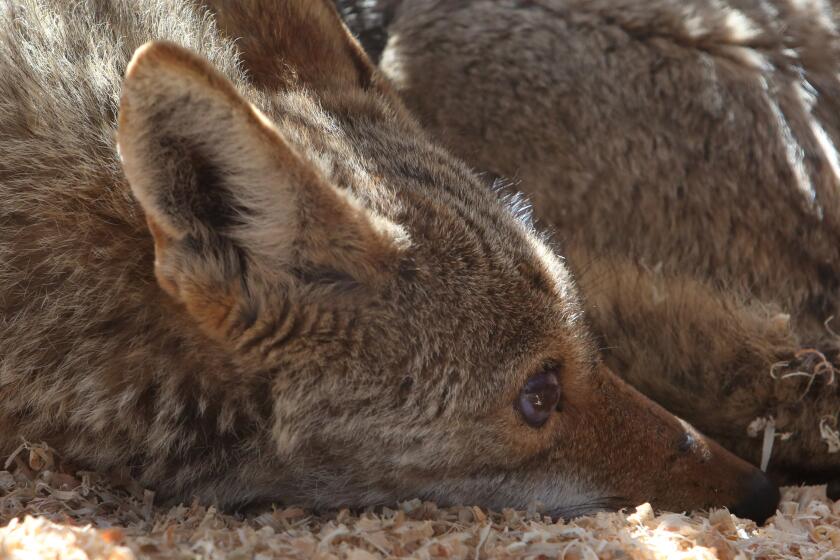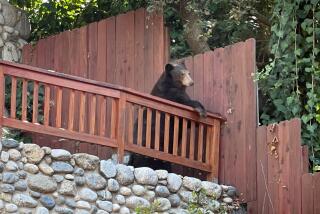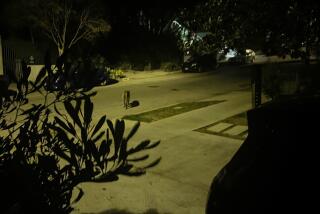‘Just not afraid of humans’: Coyotes plague Mar Vista neighborhood as pets disappear
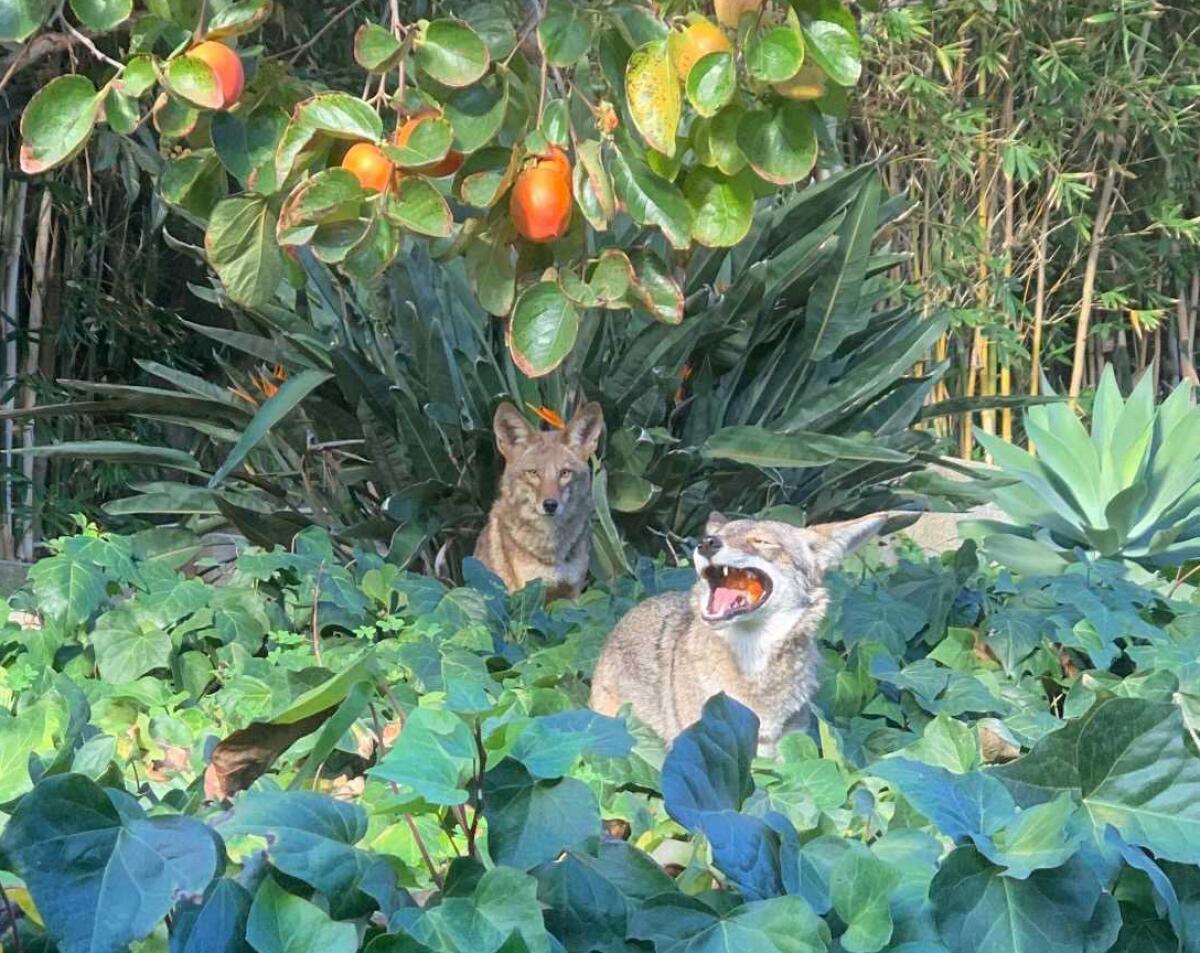
Residents of Mar Vista are certain that they are being watched.
And Jennifer Bedolla knows who it is: the pack of coyotes that she often catches lounging in her yard and that leave the carcasses of neighborhood pets around her property.
In previous years, the occasional coyote would pass through the area at dusk. But this year is different, she said, as the pack grows bolder, with coyotes trailing after people as they walk their dogs and lunging at pets and children.
“They’ve become more and more aggressive,” Bedolla said. “They’re just not afraid of humans. They’re just right on your back, running into you and not running away.”
The official response from the city of Los Angeles is that residents can clear brush from around their homes, bang pots and pans to scare away coyotes and overall coexist with the wild animals, according to an information campaign directed at the neighborhood.
Frustrated residents in the community just west of Culver City think L.A. officials do not appreciate their situation.
The usual methods don’t work for them, they say. Animal experts advise anyone who comes across a coyote to wave their arms, shout and make themselves appear as big as possible. But these coyotes are not skittish around their human neighbors.
Every day, among the hillsides, the coyotes’ yips and cries grow into a wild cacophony.
Bedolla said a coyote lunged at her 11-year-old son while he played soccer in his backyard as several other coyotes watched. She often carries her 9-year-old Maltese-poodle mix, Zola, when they go out for their weekly walk, because the coyotes seem to have claimed the neighborhood as their territory.
A number of pet dogs and cats have gone missing.
“I’ve cleaned so many neighborhood pets from my yard,” she said. “Just piles of fur and carcasses.”
A war on urban coyotes is exposing deep divisions between those who want to eradicate the animal and those who are calling for peaceful coexistence.

As hunters, coyotes are opportunists, experts say, their diet consisting of vermin, birds and, in suburban areas, human trash. They’re attracted to the scent of food on a person’s clothing and over the years have learned to live in close proximity to people.
For some residents, it’s a little too close for comfort.
But figuring out how they might get some relief — and who might help them — isn’t that easy.
One Mar Vista resident turned to the L.A. County Agricultural Commissioner’s Weights and Measures Bureau for help after a frightening encounter.
At around 11 p.m. on March 29, the resident encountered a group of coyotes while walking their dog, said Chief Deputy Maximiliano Regis of the bureau.
“The coyote sort of stopped, looked at [the person] and then made some sort of screaming or yelp sounds,” Regis said.
The dog barked back, and the resident ran away, convinced they were about to be attacked. The person called Weights and Measures to ask for help, and in early April an inspector found a mother coyote and four to five pups living in a nearby den.
The mother coyote was likely taking her pups out to hunt when the reported encounter occurred, Regis said. But because the den is within Los Angeles city limits, it’s up to the city rather than the county to determine what to do next, according to Regis.
Los Angeles Animal Services coordinates with various agencies, including the California Department of Fish and Wildlife, to deal with wild animals in the city limits. The city says the state agency manages the coyote population, but a spokesperson for Fish and Wildlife said it does not manage coyotes but provides information to local jurisdictions and the public on living with coyotes.
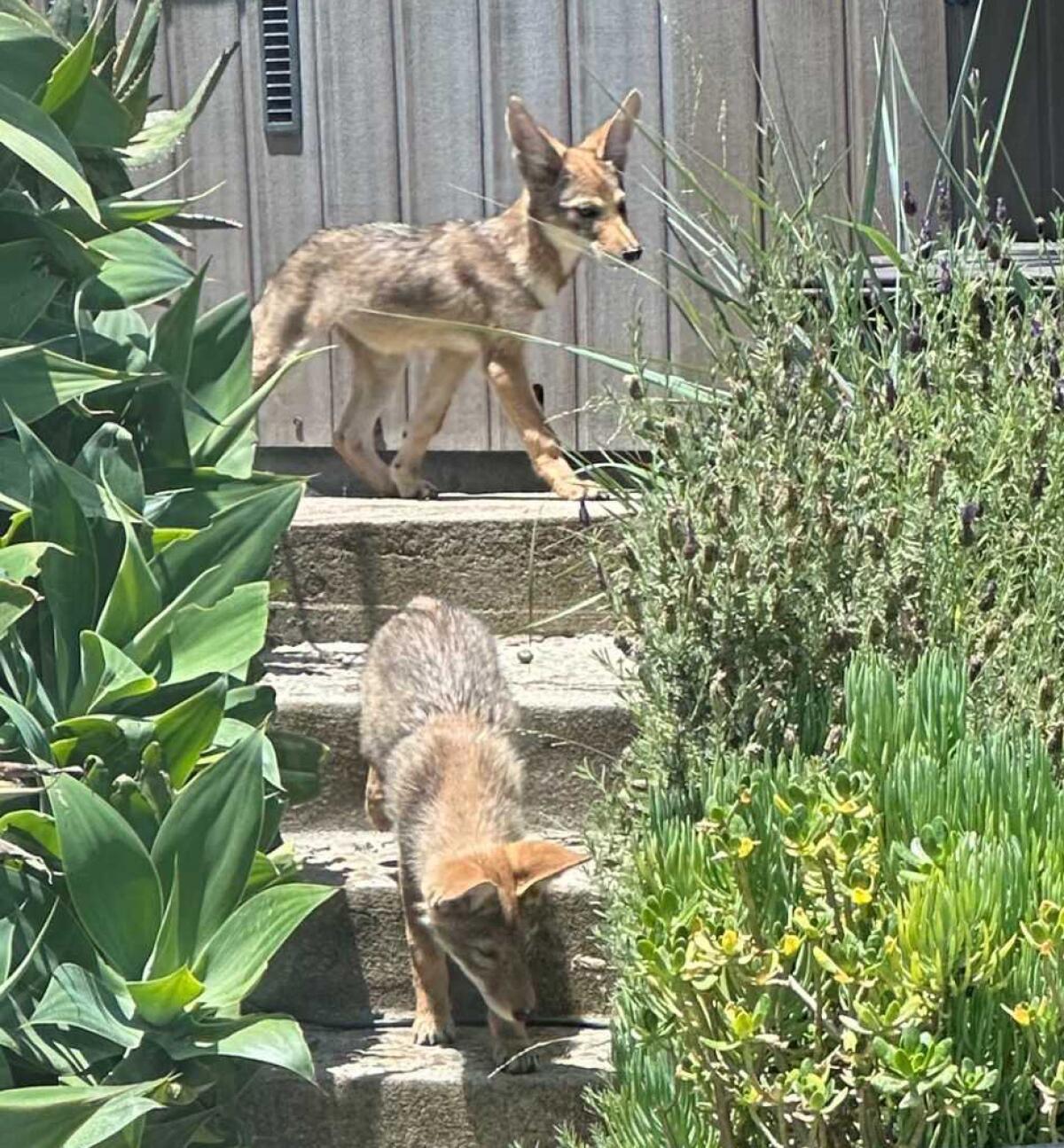
“Wildlife officers will respond to attacks,” the Fish and Wildlife spokesperson said, “but it is up to local agencies to deal with coyotes in their communities.”
L.A. Animal Services did not respond to follow-up questions about the city’s response to the coyote population. But in a statement, the agency said it hosted an online community meeting with the office of City Councilmember Traci Park as well as Fish and Wildlife to educate residents about “deterrents and property maintenance.”
The agency also hosts its own monthly information sessions about “how to safely coexist with wildlife, as well as ways for people to keep their pets safe,” according to a statement from Animal Services.
In Mar Vista, there’s a feeling that that type of safety is out of reach.
Resident Jeanelle Arias said a coyote snapped at her 14-year-old dog, Blaine, a toy breed, in their backyard. The coyote scampered away after Arias’ other dog, 7-year-old Bart, barked and gave chase. But the coyote didn’t run away, according to Arias. It hopped on top of a planter to watch what would happen next.
“If it wasn’t for Bart, Blaine would have been attacked,” Arias said. “There have been so many pets that have disappeared.”
On June 4, a coyote trailed closely behind a man as he walked his dog around the neighborhood, according to footage captured on a Ring camera video.
Neighbors said the man eventually spotted the coyote and yelled to scare away the stalker.
Park’s office said Angelenos are fortunate to “share our city with a diverse array of wildlife,” and encouraged residents to reach out to the city regarding coyote sightings.
“While we navigate this shared space, it’s imperative that homeowners remain vigilant in safeguarding their beloved pets,” the statement said.
Shelley Beringhele has lived in Mar Vista for 10 years, but her family has been in the neighborhood since her grandfather Val Ramos built his home in 1963.
Until recently, coyotes were never a concern for the community, Beringhele said, but now they shadow humans and pets.
“I find it disturbing how bold the coyotes have become and how little the city is willing to do about the situation,” Beringhele said.
But Rebecca Dmytryk, co-owner of Humane Wildlife Control, a private pest control business, sounded a hopeful note. She said the coyotes’ behavior is tied to pupping season. Coyote parents are territorial and want to convey to other canines in the neighborhood that they have pups..
It’s coyote pup season and coyote parents are on high alert, so should be hikers and their furry companions. Experts share what precautions outdoor enthusiasts should take.
“They want to make sure that dogs understand, ‘Do not come over here, because our pups are close by,’” Dmytryk said.
Despite the animal carcasses, Dmytryk doesn’t believe that coyotes are hunting neighborhood dogs but rather are looking at them as intruders.
The pupping season stretches for a few months, from the spring when coyotes are born, through the summer, when juveniles leave their parents. The coyote activity should die down by autumn, Dmytryk said.
Mar Vista is not unique, Dmytryk said. Other parts of Southern California are also enduring the pupping season, including sections of South Central Los Angeles and Woodland Hills, where she recently responded to one call to get coyotes out of a crawl space under a home.
Dmytryk said her business uses humane means of hazing coyotes. When she was contacted by one concerned Mar Vista resident, she passed along information about how they can protect their home, similar to the advice provided by the city.
California does not allow coyote traps within 150 yards of a residence without written consent, but that has not stopped some cities. Torrance contracted a trapper in an effort to manage its coyote population, including killing coyotes. The result was a state investigation over possible violation of the trapping law.
Although Dmytryk advocates for humane measures, she does agree that the city of Los Angeles should take a more proactive approach to tracking coyotes and investigate why they’re active in one area. Residents in Mar Vista agree, although some say they’re unsure what that would involve. They just know they are fed up.
Mar Vista resident Shari Dunn, on a recent night, picked up a neighbor who had just encountered a coyote as she was walking her husky puppy. The neighbor screamed and became distraught over the encounter.
“I drove her home, and she was bawling,” Dunn said. “The woman had just gotten home from work and was walking her dog. I guess you can’t do that anymore.”
More to Read
Sign up for Essential California
The most important California stories and recommendations in your inbox every morning.
You may occasionally receive promotional content from the Los Angeles Times.
